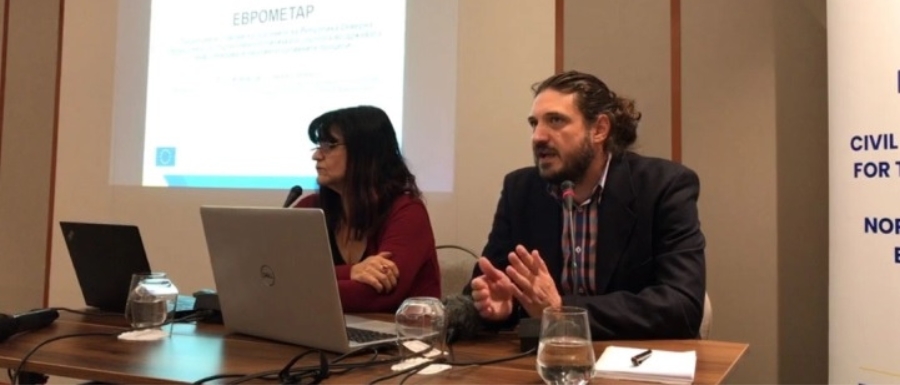Media4EU – Civil Society Program for media participation in North Macedonia’s EU membership negotiation is a project implemented by Eurothink in partnership with ALDA and BIRC.
One of the latest activities involved the presentation of the public opinion survey “Eurometer 2023,” focusing on the perception and attitudes of citizens of the Republic of North Macedonia regarding the socio-political situation in the country.
The Eurometer 2023 was unveiled during a press conference on October 24, along with a brief promotional video for the project.
Summary of Results
The methodology considers data trends from 2014 to 2023. Recent data were collected from a sample of 1003 respondents (18 years old and above) between the 4th and the 21st of September 2023, based on variables such as ethnicity, regions, and settlement (village/city).
The survey themes encompass democracy in RNM, relations with the EU, foreign policy, trust in institutions, EU topics, citizens, and sources of information.
Democracy in the Republic of Macedonia
Overall, the number of respondents who believe that there is no democracy, and things are moving entirely in the wrong direction in the country has decreased since December 2022, although it remains at 56%, significantly higher than November 2021 when the percentage was 40%. Graphs indicate that the percentage of people who believe that democracy is moving in a positive direction increased from 9% in 2022 to 15.60% in 2023.
Relations between North Macedonia and the European Union
In general, trust in European Union membership has increased, especially with a high percentage of Albanians expressing willingness to join, with 90% of the population considering it a positive move. Education doesn’t significantly influence this perception, as the percentage of people who trust the process is more or less the same. However, the urban environment tends to be more critical of the European Union, with 36% of respondents believing it would not be a good thing, compared to 29% in rural areas.
The European Union is primarily seen as a dominant economic factor (28.5%), a political community (23.1%), and a Union based on rules and regulations (20%). A better standard of living is also cited as the main reason for supporting EU entry (47.7%). Concerns about losing national identity represent the primary reason for refusal, along with lower unemployment and a greater emphasis on democracy.
Moreover, following the peak in 2022 regarding belief in the European Union’s unfair and arrogant attitude towards Macedonia, trust and the perception of a friendly and fair relationship increased from 17% to 27.5%. It remains the best alternative for 60% of the surveyed population. However, fewer and fewer people believe that Macedonia can join the European Union in the next five years, reaching the lowest point this year at 10.2%, despite more than 40% of respondents expecting entry within five years just in the winter of 2021.
Foreign Policy
The most significant percentage of respondents who perceive a threat believe that, at this moment, it is Bulgaria (79%). This response is most common among ethnic Macedonians (85.1%) and supporters of VMRO-DPMNE (89.7%) and SDSM (80.4%). The second mentioned “threat” is Russia (6.3%), particularly after the events in Ukraine. This response is more prevalent among younger respondents and those of Albanian nationality.
Source of Information
Obtaining information through the Internet (56%) and through TV (43%) are the two most common ways of gathering political news among respondents. 10% claim to be uninformed, and 13% obtain information through friends and family. Social networks emerge as the highest-ranked source (most important) for political information, securing 87% of the maximum possible score (100%). Online portals are significantly lower in rank, with only 24% of the total score. Online platforms of existing radio stations or TV channels are rated with only 7% of points earned.
EU Topics and Citizens
All topics related to EU membership are considered essential by respondents, with the judiciary and fundamental rights standing out, where 54% believe they are crucial for the accession process and 52% emphasize their significance.
Justice, Freedom, and Security
More than half of the respondents highlight the Judiciary and fundamental rights and Justice, freedom, and security as “extremely important.” The “lowest” percentage (29%) considers the free movement of goods as “extremely important.” The topics that respondents consider most important for society align with those deemed crucial for them as citizens, with minor variations in answers.
The EUROMETER 2023 is available in English and Macedonian.
